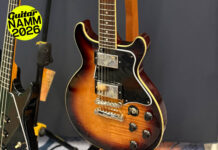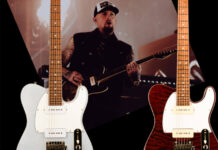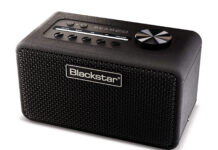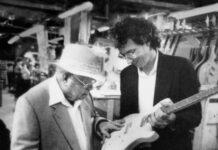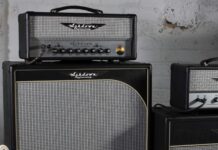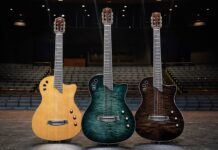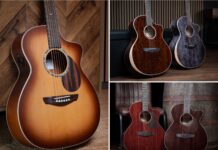
JBL EON One Compact review: “an impressively loud and lightweight portable PA”
$679/£509, jblpro.com
If you’re a solo guitarist who wants to play out – whether that’s on the street or in coffee shops or other small venues – the options at your disposal have never been better. Time was that every guitarist looking for a portable solution would simply default to the venerable Roland Street Cube, and it always amazes me how many of them you still see at the feet of buskers and other solo performers.
READ MORE: Positive Grid Spark Edge – the best smart amp for busking and small gigs?
That’s not to do down the Cube – it certainly does a job – but it’s been over a decade since its most recent update, and to say the least things have come on a bit in terms of portable speaker technology in that time.
Key amongst these for our purposes has been the rapid evolution of compact portable PA systems. What was once a hugely expensive and cumbersome option for guitar players has now been distilled into the sort of unit you can carry in one hand, and will offer a wealth of handy quality of life features for guitarists looking to play out on their own.
JBL is a hugely respected name in the speaker game – and in the world of compact Bluetooth speakers especially. I’ve got a couple of their smaller consumer units kicking around the house and have always been impressed with the sound-to-size ratio they offer. But JBL made its professional reputation making big PA speakers for musicians, can they combine these two areas of expertise to create something that will win the hearts of guitar players? Let’s take a look at the JBL EON One Compact and find out.
Image: Press
JBL EON One Compact – what is it?
The EON name dates back over 30 years – the first EON PA speakers were something of a game-changing product for JBL in terms of innovation and sound quality. We’re a guitar publication here so I shan’t bore you with the technical details of why they were so good but safe to say that the reason that name endures three decades on is a testament to the enduring quality and reputation of JBL’s speakers.
The EON One family is JBL’s powered portable PA family, which takes all of that speaker experience and scales it down into something that a musician or band can easily schlep around the place.
The flagship EON One is a serious column-style PA and costs the thick end of $1,500 – the EON one dispenses with the column and condenses it all into a single 40x30cm speaker that weighs pretty much bang on 8kg.
Squeezed into that you get a four-channel mixer that offers a pair of XLR/TRS combi inputs, a conventional ¼-inch line-level hi-Z guitar input, a 3.5mm aux in, and Bluetooth stereo audio streaming. Under the hood you also have pro-grade preamps for the XLR channels to improve your audio quality, plus phantom power for condenser mics.
Under the hood you also get built-in EQ, reverb, chorus and delay that can be accessed via the companion smartphone app which pairs with the unit wirelessly. You can also use the JBL Compact Connect to tweak the EQ and other settings more deeply – as the unit itself just has controls for treble, bass and reverb on the panel, alongside master volume and gain.
The big headline grabbers about the EON One Compact are its loudness and battery life, however. The Compact shouts at an impressive SPL of 112dB (the most of any small PA system on the market says JBL) and also offers up to 12 hours of battery life courtesy of its built-in swappable rechargeable unit.
If 12 hours is somehow not enough, the battery can be swapped in a doddle without any tools, and the pack itself will fast-charge in two hours. There’s also a pair of USB-A ports for charging your devices directly from the Compact if you so wish.
Image: Press
JBL EON One Compact – usability and build quality
Anyone who has ever had the fun and games of hoisting a PA speaker up the perilous steps of an inconsiderate venue will understand that hoisting the EON One Compact out of its box was an important first impression.
Thankfully, it passes with flying colours, thanks in no small part to the generous and substantial carry handle on the top of the unit, which has been rubberised to aid gripping. The rubbery bit is a little flimsy and I wouldn’t be surprised to find it coming off eventually – out of the box the edges of the trim are already slightly detached from the handle – but it feels suitably rugged and reassuring.
The other good first impression comes on the weight front – at just under 8kg, the Compact weighs barely half of what a valve amp often does, and is an easy one-handed lift, whether that’s out of the back of a car or onto a stage. Carrying it with a guitar case in the other hand is an absolute doddle.
In terms of usability, JBL has prioritised simplicity and straightforwardness, and while that’s no bad thing, it does give me the first indication that this is a product designed not for guitar players first and foremost (which obviously, it isn’t!).
The control panel is nicely laid out, and each knob has a light-up green ring around it so you can see what it’s set to on the gloomiest stage – there’s also a similarly impossible to miss battery gauge on the back so you can head off any power issues before anything gig-ending happens.
As mentioned above, though, you only get physical controls for master volume, gain, treble, bass and reverb – there are other built-in effects (chorus, delay and reverb) and deeper EQ editing options, but they’re all accessed by the companion app.
The JBL Compact Connect app is a smooth and reassuring affair at least, with a clear and easily navigated design – it also pairs with the speaker without any real hassles, though I’m still not sure I’d want to rely on it to tweak something mid-song.
The four tone-shaping knobs also do double duty as mix knobs for the four channels, allowing you to blend your vocals, guitar and backing track to taste with ease. You can select mic or line level inputs for the two XLR channels, as well as phantom power, and there’s also a ducking control that is likely only to really be useful if you’re talking over a backing track or similar between songs or sets.
The Compact is designed to sit either vertically or horizontally, with the design making it naturally sit in an angled position on its side for best projection. As you’d expect for a portable PA system, it also has a slot for a speaker stand should you wish to elevate the unit and get your sound out over a wider area.
Image: Press
JBL EON One Compact – sounds
Plugging in a Martin 000 Jr directly to the line-level input and the first thing that strikes you is the sheer power that this small little box packs inside it. Even at the lower reaches of the master volume’s travel, it’s pretty damn loud – as you turn it up though, it’s impressively free of any distortion, producing a clear and well-rounded sound that certainly would be more than enough for busking or small gigs.
The best thing you can really expect from a portable PA is that it doesn’t colour the sound too much, and so it is here – whether plugging in a Guild dreadnought or that small-bodied Martin, you can easily discern the different characteristics of these instruments, sonically.
It does throw up the importance of tweaking the EQ however, and while the bass and treble controls will do in a pinch, I did miss having a full tone stack to refine my sound as I switched between instruments. The app makes switching all this stuff pretty easy of course, but you’ll want to make sure you do a decent soundcheck in the venue before you get started as I wouldn’t want to have to dive into my phone between songs.
The onboard effects are a nice bonus to have. I can’t imagine I’d really need the chorus or delay very much in the course of doing what I imagine most people will be using this for – the acoustic singer-songwriter world – but maybe I’m simply lacking musical vision in that part!
I’m nobody’s idea of a good singer, but the vocal side of the Compact feels a lot more fleshed out in terms of usability. Whether I was running it through a trusty SM58 or a condenser it sounded as good as it could have done with my ropey pipes – the ability to add a bit of reverb and shine to things definitely helps here.
The only time I really took any issue with the sound was playing music through the speaker via Bluetooth – it’s nice to have the stereo option of course, but perhaps due to the lack of onboard subwoofer I felt like it lacked a little bit of bass response.
It’s less noticeable with guitar or vocals though, so perhaps this is an issue with the aux channel rather than the hardware itself?
This is obviously not an electric guitar amp, but I did give it a go running my pedalboard through it was a Neural DSP Nano Cortex acting as the amp in the chain, and it does a very perfectly acceptable job of acting as a fully-featured powered cab in this situation.
Image: Press
JBL EON One Compact – sounds
There’s no escaping that this is not a product designed wholly or indeed primarily for guitar players – the manufacturer’s blurb talks about MCs and DJs far more than it does buskers or coffee shop giggers – but that doesn’t mean it lacks huge utility for them.
As an all-in-one solution for singers who play guitar, it sounds fantastic and is – and I cannot stress this enough – bloody loud. What it lacks compared to say, the Positive Grid Spark Edge or indeed that venerable Street Cube is those bespoke guitar-centric features.
Now, you could well argue that most guitar players looking to do a bit of busking don’t really want a lot of that stuff anyway – this is a portable PA not a guitar amp after all. With that in mind, it’s hard not to be impressed by the Compact – it offers a hell of a lot of bang for a very reasonable buck.
What’s more, if you wanted to expand your horizons, you can even pair it up with a second EON One Compact to give yourself a monstrously loud stereo PA system that will happily handle a decent sized venue. In many ways, a smart and well thought out piece of kit.
JBL EON One Compact – sounds
The elephant in the room here is Positive Grid’s Spark Live ($519) which is another four-channel compact PA, but one that is more explicitly designed to amplify an entire band complete with bespoke controls for each instrument and the ability to really get deep on the guitar side. The Spark Edge ($449) is the same sketch but smaller and more coffee-shop-coded. The Roland Street Cube EX ($719) is a little long in the tooth now technologically, but guitarists all over the world love its rugged reliability and decent sounds.
The post JBL EON One Compact review: “an impressively loud and lightweight portable PA” appeared first on Guitar.com | All Things Guitar.
Source: www.guitar-bass.net

